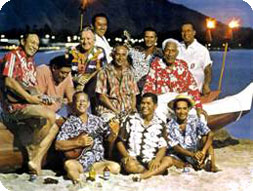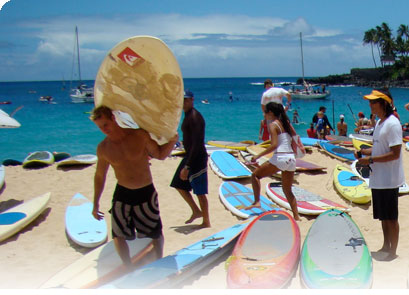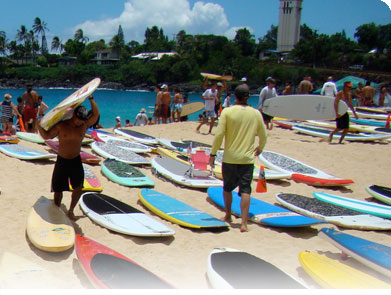above: Hui O He'e Nalu 4th of July Paddleboard Race at Waimea Bay

About The Author
Aloha my name is Gabriel Mizunaka. I am 16 years old and I live in Oahu Hawaii. I like to surf, slam poetry, rap, and dance hula and hip hop. I also have 2 triplet brothers that also surf and dance hula. I just started Stand up paddling and I love it.
Other Talk Story articles by Gabriel:
History of a Hawaiian Path-Carver
The Ocean is not an Octagon |
 |
Talk Story
THE ORIGINAL KINGS OF WAIKIKI
By Gabriel Mizunaka
When you think of the name Beach Boys, what comes to mind? Some might think of that popular band from the 60s. However, if you’re like me (straight from the islands) what might come to mind is a group of local island guys that were born and raised to surf and enjoy life. They ruled the beaches of Waikiki and were known for their water skills and love for the ocean.
But where did they come from? How did these amazing men come together at a time when surfing was on the brink of extinction? The art of riding waves was nearly gone; it was only for the rare venturesome tourist to try. So how did the Beach boys become Beach boys?
It all started with a man from Chicago. In 1907, Alexander Hume Ford came to Waikiki to discover that hotels, tourists, and shopping centers were overrunning the beaches and ocean. Ford decided that the decline of surfing and water sports couldn’t continue. He had famous writer and author Jack London write an article explaining and glorifying what he called “ a natural sport, fit for the kings of the earth.” After gaining a small piece of land by the Moana hotel Ford next founded the Outrigger Canoe Club. At about the same time many malahini, or visitors, were discovering the ancient art of surfing and canoeing. In addition many Native Hawaiians were reviving the interest of ocean sports. Surfing’s popularity was slowly but surely growing.
Ford’s new canoe club was mostly made up of haoles, or Caucasian people. As a result, a friendly rival club was formed, made up mostly of kanaka maoli, or native people, basically Hawaiians. The club was called Hui Nalu, or “ club of the waves.” At twenty-one years old Duke Kahanamoku was one of its founders. Hui Nalu didn’t have any land or a clubhouse, so they just met under a Hau tree on the lawn of the Moana Hotel, paying an annual fee of one dollar for usage.
The two clubs were nothing more than friendly competitors. As they both grew in membership, a few members actually belonged to both clubs. Everyone knew each other; there wasn’t any pilikia, or problem. However, while the members of Hui Nalu became the beach boys of Waikiki, the Outrigger club took advantage of their club location between two major hotels and formed a major beach service. This helped stabilize them financially, and gave many Hui Nalu members employment and pay. But it was Hui Nalu’s members who became known as the Beach boys.
Nobody knows who became the first beach boy, or who came up with the term beach boy. Nevertheless watermen were appearing on the sands of Waikiki during the early 1920s. There were many beach boys throughout history but the most famous and well-known beach boy is of course, the Duke.
Duke Kahanamoku and his brothers were beach boys from Hui Nalu. Duke was the most successful, competing in the Olympics and being inducted into the Water Sports Hall of Fame. His brothers were also talented surfers, swimmers, and musicians. The youngest brother, Sargent Kahanamoku, once spotted a speedboat that was floundering 3 /12 miles offshore. (Just double-checking that the distance 3/12 miles is correct?) He swam out and towed it with a rope in one hand, swimming with his other arm for nearly 4 hours. He also swam the 100-meter freestyle in less than 60 seconds.
Another famous Beachboy was Charles Kalei Baptiste Jr., better known as Panama Dave (for the gap between his two front teeth), born in Kualoa, Oahu, in 1909. While he was an excellent diver, his real talent was making others laugh. He lived life to the fullest, always entertaining and acting or playing jokes. While other beach boys would eventually turn to other jobs, Panama Dave was a beach boy for life. He was a friend with celebrities from all around. He was never taken seriously; thus, nobody knew much about him. They only knew he was a great friend, a wonderful comedian, and a lovable beach boy.
Chick Daniels was just as happy and likeable. Born in 1899 as William Daniels, he was given the name “Chick” after a popular detective at that time. He was a man with an irresistible sense of humor and a habit for spending money as quick as he earned it. He knew dozens of tourists and celebrities that would visit Hawaii again and again, the tourist industry playing as large a role in our economy as it does now. Eventually after getting that money he would spend it all on hotels, food, vacations, clothes, or whatever else. As he grew older his lifestyle suddenly reversed and he became broke and sick. The last five years of his life were spent in a convalescent home as the victim of a stroke. When he died, an era of beach boys also died with him.
There once was a time when you could ride a wave forever in Waikiki. A time when you could store your board and belongings in a banyan tree and nobody would steal it. You could eat from the abundant bananas, mangoes, and coconuts, or easily spear one of the thousands of fish that would swim in Waikiki. Before, Waikiki was paradise. But as Hawaii’s tourist industry grew the sand drifted onto the reef and cut off most of the long smooth ride the waves of Waikiki once were. Queens, a popular surf spot for beach boys and beginners, was slowly suffocated by all the sand and garbage that found its way into the ocean. Waikiki was excessively fished during the 1960s, with sand also filling up the lobster and squid holes. Sewage and pollution made its way to the reef, damaging its growth. Since then Waikiki has long since changed. But the legacy of the beach boys still stands strong. From fishing, to surfing to singing and playing the ukulele, the beach boys will always be the original kings of Waikiki. |

